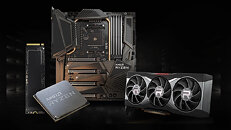Thursday, August 12th 2021

AMD Hits Highest CPU Market Share Since 2006, According to Mercury Research
AMD has hit its highest "PC processor" market share since 2006, according to the latest market analysis report by Mercury Research. The firm's PC processor metric only covers client-segment processors (excludes the strides AMD has made in the enterprise space with EPYC). According to the report, AMD now holds 16.9% of the market, its highest since 2006. This is a 0.8 percentage points increase sequentially, and 7.3 percentage points growth year-over-year.
When looking at the overall x86 processor market (which now includes enterprise chips), AMD holds 15.8 percent, which is a 0.7 percentage point sequential gain, and 4.1 percentage points gain YoY. AMD holds 11.6% of the server processor market. Market share only paints part of the picture. Guru3D notes that AMD is trading market share for margins, by reducing shipments of low-cost processors in favor of premium processors with higher margins.
Source:
Guru3D
When looking at the overall x86 processor market (which now includes enterprise chips), AMD holds 15.8 percent, which is a 0.7 percentage point sequential gain, and 4.1 percentage points gain YoY. AMD holds 11.6% of the server processor market. Market share only paints part of the picture. Guru3D notes that AMD is trading market share for margins, by reducing shipments of low-cost processors in favor of premium processors with higher margins.

17 Comments on AMD Hits Highest CPU Market Share Since 2006, According to Mercury Research
Bulldozer, yes, it was a marketing failure. AMD's Pentium 4.
Considering that, the real ratio how it has eaten the desktop/workstation/server market is very respectable.
On the actual topic....great....now can they use this immense profit to maybe lower some (gpu) prices? ya know, bit like Epic giving back based on their tremendous succes?
COULD ARM dominate? Absolutely? Will it? Well, every attempt to make a high power ARM design has either failed or has not lived up to expectations, and even if apple figures it out, that's apple, they're a blip on the radar outside of mobile devices. ARM is dominant in mobile, but has never made a succesful jump to desktop outside of tightly controlled enviroments, like apple macbooks or that new russian machine. Once I can buy a ARM processor and stick it in a desktop motherboard it might have a chance.Even ignoring the quad core push, the pehom I was still a failure. At the same clock speed it was slower then the first gen core 2 duo, and it couldnt clock as high to boot. To make matters worse, the second gen core 2 design with the larger cache came out the same year.
This goes to show you really need a long breath in your architecture and/or constant improvement. Intel failed doing that after a long time and started hurting for it. I hope AMD can keep this momentum and improvements in Zen.
The server and professional market is well entrenched, AMD's software suite still pales compared to intels. As that changes we see adoption increase, in addition to the sheer performance differenc egrowing too big to ignore.
I hope intel starts getting more competitive again, the price hikes lately from AMD completely wipe out the value proposition from their new hardware.